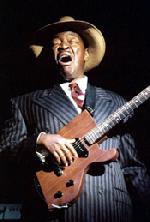SEARCH CurtainUp
REVIEWS
FEATURES
NEWS (Etcetera)
ADDRESS BOOKS
Broadway
Off-Broadway
BOOKS and CDs
OTHER PLACES
Berkshires
London
Los Angeles
Philadelphia
Elsewhere
QUOTES
On TKTS
LETTERS TO EDITOR
FILM
LINKS
MISCELLANEOUS
Free Updates
Masthead
NYC Weather
Thunder Knocking on the Door
by Les Gutman
|
They can't put a price on your music, Jaguar. It's like putting a price on your soul. ---Marvell Thunder |

C. Cooper
(Photo: Joan Marcus) |
That said, it's also an offering that challenges our expectations management skills. For Thunder is billed not as a concert or even a musical revue but as full-fledged musical theater, and as such, it comes up short. I'm going to wallow for a bit in criticizing its shortcomings, but don't dare let that spoil your good time.
The "book" for this show sets off limping, with the cast onstage positing a nexus between the blues of the Mississippi Delta and the origins of African Americans in the delta of the Nile. It's a theme further evoked by Eugene Lee's claustrophobic set, which fashions the gable of the Bessemer, Alabama homestead of a family by the name of Dupree to look like a pyramid and (lest anyone miss the connection) paints the maps of the two mighty river systems on its fašade. Once the performers are able to gain their footing, Keith Glover tells a story which seems more akin to Greek mythology than anything Egyptian; blue-eyed and Blues-infused Marvell Thunder (Peter Jay Fernandez) wields supernatural powers (seemingly brought on by truly feeling the Blues) like making a blind woman see again, while he progressively turns to stone.
Thunder has had a lingering chip on his shoulder toward the Dupree's since the patriarch of the family, Jaguar Sr. (Chuck Cooper), now dead, bested him in a "cuttin' contest" (on the blues guitar). He's just wheedled one of daddy's prized guitars out of Jaguar Jr. (Michael McElroy), who is more interested in rock than the blues, and has his sights set on the other one, which was inherited by daughter Glory (Marva Hicks), who is blind; but not until he restores her vision and, coincidentally, falls for her. Meanwhile, the widow Dupree, who is called Good Sister (Leslie Uggams), has taken up with the identical twin of Jaguar Sr., Dregster (also Cooper). All of this is fine except that none of it holds together. But, in the words of the glorious song with which Ms. Hicks will end the show, it's time to be "Movin' On".
Just about any story would be sufficient justification for the music Thunder brings our way. With Mr. Glover, Keb' Mo and Anderson Edwards have provided a triumphant score that is blues-heavy but also features a healthy dose of rock, soul, R&B, gospel. The outstanding band executes it stunningly, aided by some surprisingly good help on the harmonica by Messrs. Cooper and Fernandez.
All five performers are sensational singers, and each gets to shine. Fernandez comes to life with "Stranger Blues," carries the audience warmly to the intermission in his duet (with Ms. Hick), "See Through Me" and impresses us further still with his B. B. King-ish "Even When You Win, Sometimes You Lose". McElroy has a great time with the show's only legitimate rock-and-roll song, "Big Money," and is most affecting with "Take On the Road". Cooper leads the way on the gospel front, with "Hold On" and exhibits the show's greatest vocal acrobatics at the end of "Take On the Road". He also deserves special commendation for his acting throughout: in a show in which his colleagues sometimes fall into the trap of "performing" rather than "acting" (and it's easy to do), Cooper shows himself to be a gifted actor who brings concentrated depth to his roles.
Marva Hicks is a revelation, whether singing the duet with Hernandez that ends the first act, the punchy "I'm Back" solo early in the second act, or the finale in which the term Aretha-esque seems most apt. The thoroughly endearing Leslie Uggams is, well, Leslie Uggams. Nuff said. Perched on a window sill singing "Willing to Go" (the show's penultimate song)and eternally projecting her trademark smile, Ms. Uggams cements her status as a legitimate treasure.
Although I was not at all satisfied by the sets for this show, the remaining design elements are just fine: Toni-Leslie James's costumes are perfect, ranging from the outlandish suits of the menfolk and Glory's blazing outfits to the frumpy dresses for which Good Sister seems to have a penchant; Natasha Katz's lighting suits the mood consistently; and Acme Sound Partners has done a good job (if somewhat over-amplified at times) of making sure that not a note of the singing, or a nuance of the sound effects, is lost. Oskar Eustis directs with style and an awareness of the talent he has to display.
|
Thunder Knocking on the Door
by Keith Glover Music and lyrics by Keb' Mo' and Anderson Edwards, with additional music and lyrics by Mr. Glover Directed by Oskar Eustis with Leslie Uggams, Chuck Cooper, Peter Jay Fernandez, Marva Hicks and Michael McElroy Set design: Eugene Lee Costume Design: Toni-Leslie James Lighting Design: Natasha Katz Sound Design: Acme Sound Partners Music Direction: George Caldwell Musicians: George Caldwell (keyboards), Billy Thompson and Billy "Spaceman" Patterson (guitar), Toby Williams (drums) Anderson Edwards (bass) plus Messrs. Cooper and Fernandez (harmonica) Arrangements and Orchestrations: Zane Mark, Linda Twine and Mr. Caldwell Original Orchestrations: Anderson Edwards Musical Staging: Luis Pewrez Running Time: 2 hours, 15 minutes with one intermission Minetta Lane Theatre, 18 Minetta Lane (east of 6th Av) Telephone (212) 307-4100 Opening June 20, 2002, open run TUES - SAT @8, WED, SAT @2, SUN @3, extra performance 7/1 @8, no performance 7/4; $45-65 Reviewed by Les Gutman based on 6/27/02 performance |
|
Musical Numbers
|
|
Act One
|
Act Two
|

6,500 Comparative Phrases including 800 Shakespearean Metaphors by CurtainUp's editor.
Click image to buy.
Go here for details and larger image.



